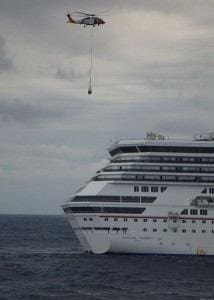Travel News
What Happens When a Passenger Goes Overboard
Last week authorities were searching for a couple that fell overboard the Carnival Spirit off the coast of Sydney. This might seem like an isolated incident, but passengers falling overboard happens more frequently than you might expect. Though there isn’t one central resource for reporting these incidents, most figures cite between 70 and 100 incidents of passengers falling overboard in the last decade.
Carnival Cruise’s railings, like most cruise lines, are 44 inches high so it’s unlikely for a passenger to simply fall during the normal course of activity.
Instead, according to Cruise Critic, these falls can usually be attributed to about four factors: suicide, intoxication, reckless behavior, and accidents. Cruise expert Ross Klein, founder of CruiseJunkie.com, cites alcohol as the most common cause.
Cruise Page, a website that tracks cruise statistics, has pulled out some interesting trends. It turns out that males are much more likely to go overboard than females. On average, a passenger that goes overboard is 41 years old. Most incidents happen at night.
What’s surprising is that Carnival cruise passengers are more likely than any to go overboard. Cruise Page cited 28 incidents (excluding the most recent situation in Australia) with that cruise line alone since 2000. In fact, in one three-week period in 2009, three passengers fell overboard.
 In fact, Carnival is currently being sued by a passenger who was intoxicated and jumped off the ship. The incident occurred in October 2012 when Sarah Alexandra Badley Kirby fell from her balcony (Carnival alleges that she jumped) on the Carnival Destiny. Kirby notes that the captain refused to turn around until a search was conducted. She also alleges that the cruise line got her drunk by encouraging her to drink Long Island iced-teas by giving her free $5 casino coupons.
In fact, Carnival is currently being sued by a passenger who was intoxicated and jumped off the ship. The incident occurred in October 2012 when Sarah Alexandra Badley Kirby fell from her balcony (Carnival alleges that she jumped) on the Carnival Destiny. Kirby notes that the captain refused to turn around until a search was conducted. She also alleges that the cruise line got her drunk by encouraging her to drink Long Island iced-teas by giving her free $5 casino coupons.
This is just one of the high-profile incident plaguing Carnival. The cruise line has been waging a war of public opinion after the high-profile engine fire onboard the Carnival Triumph left passengers stranded without power for days. In fact, Cruise Critic’s Carolyn Spencer Brown even went on record with her concerns.
Back in Australia, the staff on board the Carnival Spirit worked with the New South Wales state police to conduct an air and marine search. The cruise line has also released a statement regarding the fall noting that security camera did not capture criminal activity or “foul play.” Instead, “out of respect for the families, [Carnival is] not going to publicly disclose the details of what occurred at this time.”
In general, when a passenger goes overseas, cruise lines have an established protocol. A ship must reverse course, turn off the engines and deploy lifeboat rescue teams. Often other ships are called in to help alongside the Coast Guard. There is no limit on the extent of the search. Instead, a Captain will determine the length of the search following laws of SAR (Search and Rescue) and SOLAS (The Safety of Life at Sea).
- Is Carnival Cruise Cutting Corners: The Experts Weigh In
- Cruise Safety Concerns: Is Carnival Doing Enough?
- Two Reasons to Buy Travel Insurance for Your Next Cruise
- Post Carnival Triumph: How Safe Is Your Cruise?
By Lily J. Kosner for PeterGreenberg.com












